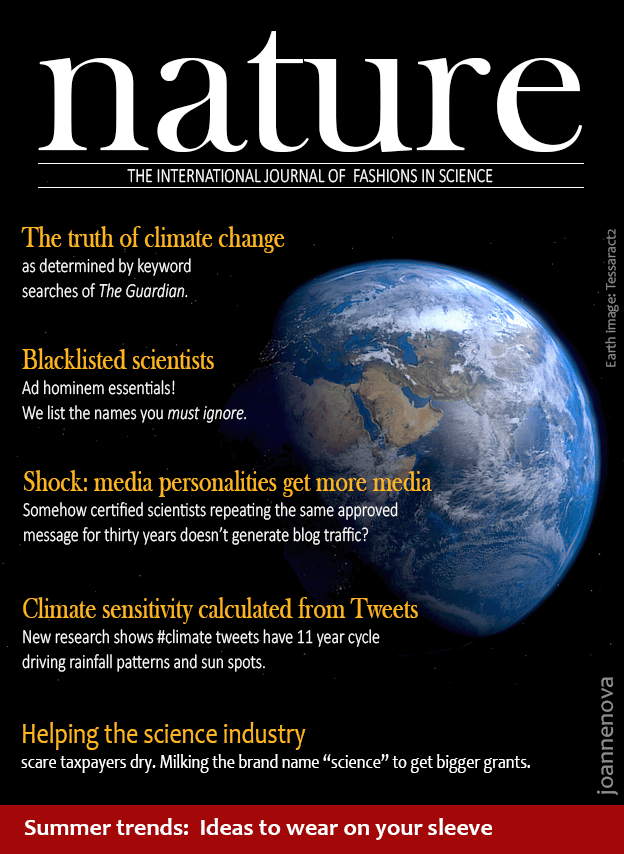When the formerly esteemed journal Nature endorsed one side of politics in 2020, apparently it didn’t change any votes, but about a third of Trump supporters decided the science it published was politically biased too. The loss of trust in Nature was so strong that it tarnished the whole field of US science. (Zhang et al)
There goes the public faith in peer reviewed “Experts”.
“Trump supporters who had been shown the summary of Nature’s editorial were less likely to trust Nature’s information on COVID-19, and also reported more mistrust in US scientists.”
Being actively political meant 154 years of scientific reputation disappeared just like that. In the graph below presumably* naive Trump supporters ranked Nature as mostly “informed” (marked in orange, of course). The Trump supporters who saw the political endorsement (marked in red) suddenly, apparently saw Nature as more of a partisan rag than an impartial reporter of scientific truth.

@Nature says: In 2020, Nature endorsed Joe Biden in the US presidential election. A survey finds that viewing the endorsement did not change people’s views of the candidates, but caused some to lose confidence in Nature and in US scientists generally.*
Naturally, although the data was smashingly strong, Nature completely missed the signal. The editors tell us it’s the voters fault:
This experiment builds on the literature on trust in research among people with different political allegiances. This includes the idea of confirmation bias, whereby people on different sides tend to favour evidence that supports the views they already have, while avoiding evidence that does not, and the backfire (or rebound) effect, whereby evidence that challenges a view can have the opposite effect to that intended.
So Nature took a hit for the team. The editors say they had to do it, and would do it again.
Jo Nova says, please do, your science journal is a travesty of bias and unreason, and the more voters that realize that, the better. Endorse Away! Nature also endorses namecalling in science and published “research papers” on how to convince “climate change deniers” to believe (Bain et al). I offered to help them reach thousands of deniers, if they could only define the term scientifically and name the evidence that deniers deny. They were unable to. I managed to get an apology issued then. But, true to their religion, Nature was the journal that published a blacklist of 386 scientists and commentators who got too much media on climate change and shouldn’t be listened to (Petersen et al). It was an honor for me to be be listed at 99. (With the other half, David Evans very pleased to be ranked at 57).
To mark the occasion I designed a cover page just for them for free:
Since 60% of US voters already think climate change is a religion, all Nature has to do is keep pumping out these kind of excuses (below) and no one will believe anything it says. It’s acting for all the world like a Union of Science Bureaucrats that think they know what’s best for the health and wellbeing of US citizens, even if the voters aren’t smart enough. Nature, being paid mostly through government funded subscriptions knows Big Government is always the answer.
Excuses from the Nature Editorial Staff:
Should Nature endorse political candidates? Yes — when the occasion demands it
Political endorsements might not always win hearts and minds, but when candidates threaten a retreat from reason, science must speak out.
…the study does question whether research journals should endorse electoral candidates if one implication is falling trust in science. This is an important question, and there are, sadly, no easy answers. The study shows the potential costs of making an endorsement. But inaction has costs, too. Considering the record of Trump’s four years in office, this journal judged that silence was not an option.
Nature’s October 2020 editorial was an appeal to readers in the United States to consider the dangers that four more years of Trump would pose — not only for science, but also for the health and well-being of US society and the wider world. Trump had laid waste to science and scientific institutions at home on issues from COVID-19 to climate change, and had gutted environmental regulations even in the face of increasing climate risk. At a time when the world needed to unite to deal with these and other global threats, he took an axe to international relationships, pulling the United States out of the 2015 Paris climate agreement and the United Nations science agency, UNESCO. He moved to defund the World Health Organization, and he walked away from a deal (the Joint Comprehensive Plan of Action) that the United States had carefully negotiated with Europe, China and Russia to prevent Iran’s government from enriching weapons-grade uranium. It is hard not to think of a worst-case scenario for public health, climate change or nuclear security had Trump remained in office today.
How dare any political leader defund globalist committees that spread viruses and rave about President Xi?!
____________
* The graph Nature tweeted doesn’t say what the survey answers relate to, and the paper is behind their own paywall, but we presume this graph refers to a question about their own reputation, not how Trump supporters scored on a science-quiz.
REFERENCES
Floyd Jiuyun Zhang, Political endorsement by Nature and trust in scientific expertise during COVID-19, Nature Human Behaviour (2023). DOI: 10.1038/s41562-023-01537-5. www.nature.com/articles/s41562-023-01537-5
Alexander Michael Petersen, Emmanuel M. Vincent & Anthony LeRoy Westerling (2019) Discrepancy in scientific authority and media visibility of climate change scientists and contrarians, Nature Communications, volume 10, Article number: 3502 (2019) | Copy of the deleted supplementary list here.
